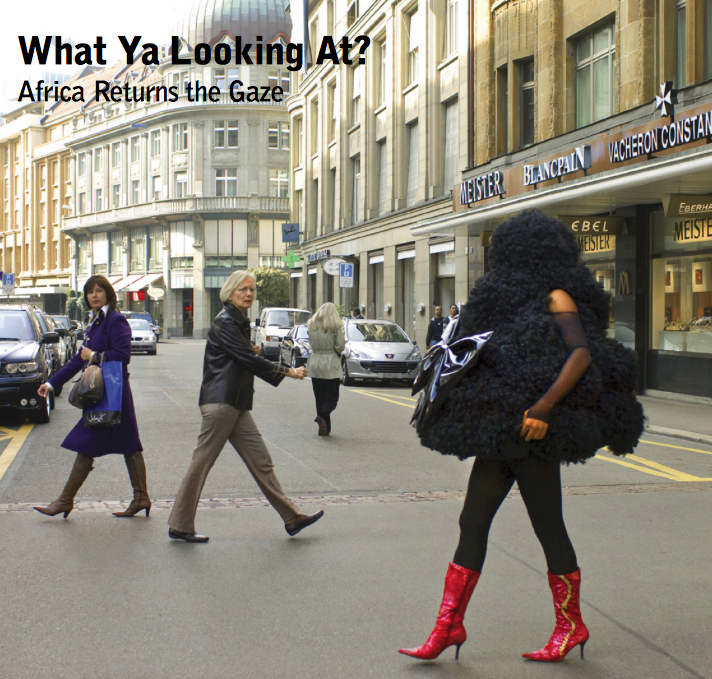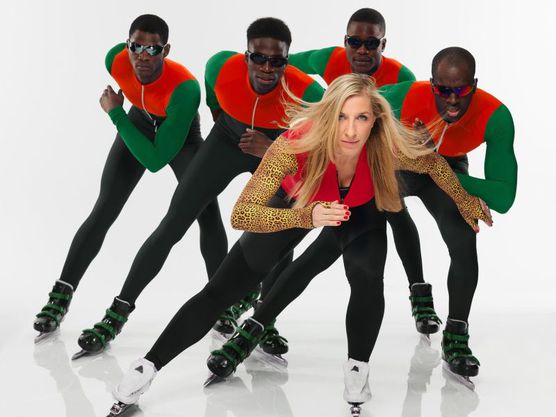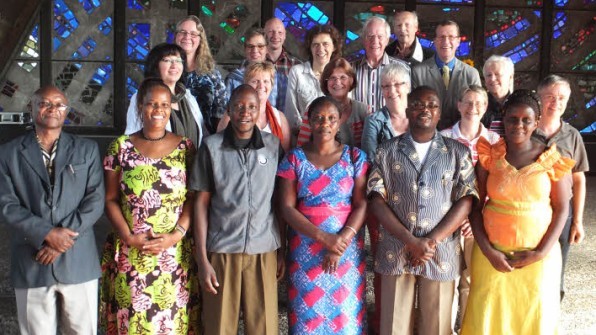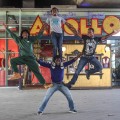Last April in Berlin, as part of a group of travelling poets and writers, I watched a panel of individuals profess to speak about European–African relations. It was excruciatingly stilted in its attempted political correctness. There were four German pan- ellists against the Kenyan, the well-known rapper MC Kah. When Kah was asked what he thought Africans generally thought of Europe, he seemed to fog up, lose his usual easy, natural rapper self, which has made him a Nairobi crowd favourite, and finally blurted, as if in pain: “It’s old. Europe is old.”
In the 1960s, after independence, African education curriculums retained large doses of centuries of European his- tory, which continued to be forced on new generations. A push for Africanisation later introduced the continent’s own post- independence history and, in comparison to European history, these new narratives seemed contemporary and immediate to Africans. Official images of Europe, medi- ated through TV, postcards and magazines, remain generally monumental: heavy, grey and imposingly permanent castles, ancient battlefields and cobbled villages. Even recent ubiquitous statistical reports on Europe that are distributed in Africa con- stantly paint European populations as old, adding to an imagined narrative of Europe as ancient to Africans. MC Kah’s reaction represents a larger African idea of Europe. Age. Authority. The Old World.
However, Africans’ daily encounters of contemporary Europeans are with the tour- ist, the missionary or the expatriate. Adding to simplistic ideas of ancient authority, these encounters create false impressions of affluence, confidence and knowledge. Europe thus becomes an object of desire, especially amongst younger generations of Africans. It is this pining for the imagined good things of Europe that makes young Senegalese, Eritrean and Somali men get onto the tiniest of skiffs and brave the storms of the Mediterranean. In Nairobi’s coffee joints, one now observes tall dark young women with mixed race babies. And there’s nothing wrong with that, if one can imagine equal relations in the couplings of middle-aged white men and young Kenyan women. This African desire for Europe has created a veritable cottage industry. A young Kenyan woman without the right education or middle-class upbringing can find a safe and solid exit strategy by seeking out a middle-aged or older white male, either a tourist, development worker or expatriate. A sizeable population of young Kenyan men also make it their life-quest to pursue white female UN workers and interns from international government agencies that are housed in Nairobi. This pursuit in nightspots has cultivated its own sub-culture and economy. Even when it’s clear that these white young women have very little economic wealth, the sheer perception of whiteness and Europeanness, in and of itself, presents enough value for certain Kenyan youth. This desire to have some connection, however tenuous, with the larger idea of Europe or America looms for these youth.
James Baldwin observed that “No one, after all, can be liked whose human weight and complexity cannot be, or has not been, admitted.” The colonial experience is at the heart of the skewed encounter between the European and the African. The countereffect of the African’s perceptions of the European is that he lacks the weight and the complex- ity that has been conferred on the European. Therefore, to the perceptions of the ancient, the affluent and the knowledgeable is added a developed sense of inferiority, especially in older generations of Africans. Add in the daily encounters with their false impressions and, inevitably, envy, dislike and even a reverse racism come into play.
Mixed emotions and mixed stereotypes thus recreate Europeans as pale and weak when observed hiding from the African sun. They are seen to have a deathly fear of malaria and other tropical diseases, even when these diseases kill Africans by the thousands each year. The envy, tinged with class connotations, further confers a slyness and closed-heartedness to Europeans not too different from that extended to other groups, whether ethnic or religious, that are perceived as more affluent.
Yes, Europe is staid and stale. A cemetery. A cold one at that, snowed in and buried under the weight of its long, long history. Europeans are affluent, knowledgeable, weak, sly and grappling. And so, Africa becomes new, energetic. Africa is seen to be rising.
xxxxxxxxxxxxxxxxxxxxxxxxxxxxxx
I grew up in what was called an “estate” in Nairobi, a place called Buru Buru, with middle-class pretensions of aspirational education, financial savings for self-improvement, and a new Protestant work ethic. There, I encountered Europe through the books of my father’s library, a small three-tiered shelf. When I’d run out of Enid Blyton and all other childish narratives from England, I turned to this shelf and its eclectic collection: Shakespeare’s Julius Caesar, which I read again and again to distraction; a few other Shakespeare plays; the English version of Reader’s Digest; and a bright loquat-yellow copy of Walter Rodney’s “How Europe Underdeveloped Africa“. I immediately sensed this was an important book from its bold unfriendly title.
My relationship with my father had taken a strange turn when I reached my teens. He’d become extremely hostile to what he saw as my hiding inside books or films, avoiding reality. My father is a telecommunications engineer with more than a practical bent. A difficult childhood in the Native Reserves and a gruelling teenage-hood as a first-born son of a single mother somehow created in him an atavistic belief in following the rules. This was in spite of working most of his life in a government parastatal known for its systemic corruption. The life lessons he imbibed from all these experiences were the soundtrack of my young life, transmitted on morning drives to school or while the family watched TV in the evenings. One of these was a constant refrain about the “Muthungu“, the European, from his early experiences of the Englishmen he’d encountered as a child in Muranga, at school, and eventually in his workplace. “Mundu witagwo Muthungu ni mundu serious, ni mundu honest.” A European is always serious, always honest.
The musty pages of Walter Rodney that I picked up from his small bookshelf, however, refuted his joyless sentiments. I detected a rage in Rodney’s classic anti-colonial text, in its miniscule font, in its loneliness on my father’s shelf. The book had not been picked up in years and, at that age, I was ill-equipped to struggle with its realness, its unflattering depictions of the European – just as I was ill-equipped to deal with my father’s antagonism towards my penchant for the fictional, be it movies, novels or Shakespeare. “The world is not like that. That is not reality,” he would say, referring to the latest fiction I was reading.
I could clearly see that my father had extensively read the Walter Rodney book. Full passages were marked with his small scrawl. Between his rants against my innocent take on the world and his underlined passages, I realised that a disillusionment with independent Kenya might have revised his ideas of Europeans.
The attacks on my reading ended when he found me poring over Rodney. He grunted and, from that day, stopped his flippant lectures on my perceived escapism. I realised something about him then – a certain inscrutability dropped away. I did some growing up when I got a glimpse of his complex worldview. I realised that his attacks on my fondness for fiction expressed anger at my belief in a world that did not exist, the world of false aspiration he had sought through education and the modern trappings of a car, a house, modern cutlery and manners. I saw that, even after achieving what he saw as a Europeanness, the new Kenya left him empty and angry with its never-ending national mantras of hard work, progress and harambee – collective self-actualisation. And so, to him, Europeans were serious. All things modern, and by extension European, had to be pursued, irrespective of whether they provided fulfilment. To remain un-modern, un-European, was not an option, even if it was to be realised through a joyless practicality. There he was: angry in an in-between world of aspiration for a Europeanness that would never be his and the Kenyan reality of his past, the village and what writer V.S. Naipaul called the “always threatening bush”, that needed to be avoided at all costs, especially for me, his son.
Years later, I found myself at the University of Edinburgh, Scotland, pursuing a masters degree in creative writing. One night, during one of those innumerable reading evenings that are part of any writing department, I met an aspiring writer named Claudia who was clearly not part of the circuit.
“There are 40,000 Polish people in Edinburgh,” Claudia said to me. “I want to start my own reading in a café in town,” she added, with a sniff at the dour castle interior. This was not due to the damp walls. “I want it to be open and free and diverse and want you to help me.”
A week later, dead cold under the high evening sky, I arrived early by taxi at Claudia’s place in Foley, which I’d never heard of. It was the farthest I had ever been from the posh Royal Mile in central Edinburgh where I stayed. The small mean flats, deep underground, with little lighting, aroused my interest, my idea of “keeping it real”. The door immediately swung open when I knocked. Claudia stood there and burst into happy laughter when she recognised me, touching the top of her chest.
“Willy, no?” she said. “I can’t remember or pronounce your second name. Come in. Come in.” I did not bother to correct her. It was quiet inside the flat. “Oh dear. Nobody is here yet. We don’t really expect anybody. But come in. Come in.” She said all this breathlessly. The flat was not heated and her words came out in small excitable warm puffs. “Why the serious face? People here in Edinburgh take themselves too seriously.”
Another girl sat in the living room at the far end of the only couch, dressed in a night-gown and slippers. There were only two rooms. The living room I had walked into betrayed, by its smell of sleep, that it doubled as a bedroom. A small table in the corner of the room held some feta cheese dishes and a cake, deep brown and thickly rich.
Claudia disappeared into the other room. I was cold and stiff, so I tasted some of the cake idly. I regretted coming all this way now, even if my non-professional interest in Claudia did not wane. The cake was fantastic.
Somehow the Polish writer and journalist Kapu ci ski came up. “Yes. Great writer,” Claudia now said. I allowed that Kapu ci ski had some merits. But then I made it clear that the man had done a great disservice to Africa by his criminal generalisations.
“What would you do. Yourself,” the other girl said, speaking for the first time, her voice too loud in the small apartment.
“I would never generalise.”
“Willy. Willy. Willy,” Claudia started at my tone. “We are not general. Not every Pole is a Kapu ci ski. I could be his granddaughter, but so what?”
“The man wrote one good book. It’s called Another Day of Life,” I said and could not let it go and ranted away.
“Let’s talk about my writing café,” Claudia finally said. She flounced to the middle of the room and twirled. Kapu ci ski, Africa and writing disappeared in the small room with its mean walls. The roommate joined her, shrugging off her dressing gown.
“Willy. You know what we call this cake in Poland?” Claudia asked after maybe our fourteenth dance.
“There is a cake called Black Forest in my country that tastes like this,” I now laughed, parrying the shot, twirling her around.
The two girls laughed, delighted.
“Then, it is okay,” Claudia said, the smile leaving her face. “We call it Little Black Man cake.” I stopped. Claudia grinned.
“It is a very famous cake. Everyone likes it. So, if you like it, you are now Polish. Little Black Man cake.”
I finally just laughed and we all laughed.
I wondered why I did not give an anecdote of my own – tell Claudia and her friend that in my country they were called Mzungu, and repeat the common refrain that it comes from Kizunguzungu, which means “dizziness”.
But I let it go. I’ve had several encounters in Europe with Europeans where I’ve been asked not to take everything too seriously and the thought of the Kizunguzungu anecdote has come up. These are far from the serious professional and personal encounters of real value and exchange, where my weight and complexity have been considered. And, in many ways, the more I have of these encounters, the less I react with a knee-jerk anger. I let it go.
This is, I feel, an eventual reaction to Europe and Europeans by Africans – that there is a lot that has to be let go. And there is a lot to be grappled with. This is something I feel that my father, in his anger against the modern world, the “European” world, did not come to terms with. And what might really matter is not so much what one thinks of the Other, but how self- knowledge can be built on one’s own terms. And that was what happened to my perception of Europe that cold wintry Edinburgh night. That it was just another place that had been building its own self-perception on its own terms for a long time, and it was time that I did that too.
Billy Kahora lives and writes in Nairobi. His short fiction and creative non-fiction have appeared in Chimurenga, McSweeney’s, Granta Online, Internazionale, Kwani? and Vanity Fair. His story “Urban Zoning” was shortlisted for the Caine Prize in 2012, and a new story, “The Gorilla’s Apprentice”, has recently been shortlisted for the 2014 prize. He is also managing editor of Kwani Trust and an associate editor with the Chimurenga Chronic. He was a judge of the 2009 Commonwealth Writers’ Prize and the 2012 Commonwealth Short Story Prize.
The article was first published in the Heinrich Boll Stiftung Magazine, you can read it here.







